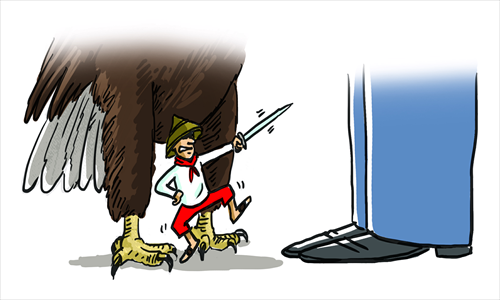US, China must avoid Thucydides Trap

The Fifth China-US Strategic and Economic Dialogue (S&ED) on Wednesday and Thursday is essential for both countries in order to establish a new type of major power relations.
Such a dialogue must be oriented toward peace, development, and cooperation. Significantly, both sides indicated support for these objectives at the June summit between Presidents Xi Jinping and Barack Obama.
In recent years, some politicians and officials in the US have advanced a confrontational view of US-China relations. Influenced by political scientists and strategists who subscribe to win-lose, or zero-sum international relations theories, they call for hard power containment of China.
Opponents of this policy seek a win-win solution through cooperation in the diplomatic, security, and economic areas. They also call for strengthening people-to-people exchanges and cultural ties in order to build a good foundation for long-term friendship and cooperation.
Advocates of hard power containment often refer to the theory that a power which has had supremacy fears a rising power and thus the potential for war increases.
Western academic theorists and strategists often point to the example of the conflict in ancient times between Athens and Sparta.
They draw their theory from the historian Thucydides (460BC-395BC) and his book on the Peloponnesian War (431BC-404BC). This war between Athens and Sparta and their allies took place following the victory of the Greeks over the Persians in the Persian Wars (499BC-449BC).
During the Persian Wars, the Greek states eventually formed a military alliance called the Delian League and placed Athens in charge.
When the war was over, the alliance members wanted to return to their independent status. But Athens sought to dominate them and to impose its supremacy.
This imperial policy on the part of Athens and the resistance to it by others were arguably the underlying cause starting the Peloponnesian War.
Thucydides, an Athenian, wrote that fears caused Sparta's move against Athens and noted some of Athens' provocative actions. Modern-day Western theorists and strategists latch on to this interpretation and create a model which posits inevitable conflict between major powers in this situation.
Such theories have consequences because they can create justifications for an arms race and worse if translated into national strategy. Designing politicians and special interests can use them to create unnecessary military expenditures as well as counterproductive foreign policy which can lead to war.
It is highly significant that the present Chairman of the US Joint Chiefs of Staff, Martin Dempsey, calls for avoiding what he calls the "Thucydides Trap" with respect to US relations with China.
He has stated publicly on a number of occasions that he does not want fear of China to make war inevitable and so advises senior civilian leaders. He himself is the senior US military leader and reports directly to the US president.
With respect to the S&ED process, particularly in the military and diplomatic discussion, such a perspective for war avoidance must be not only articulated but also given concrete form.
Going beyond discussion means, for example, building trust and confidence, deepening consultation, expanding practical cooperation, developing mechanisms to deal with special problems, and making arrangements on issues of major geopolitical significance.
There must be a broader perspective than the Asia-Pacific region. Such a broader perspective must include a larger concept of a Pacific community which takes in not only the Asia-Pacific but also the Americas.
Both sides must take into consideration historical sensitivities, and both sides must work toward arrangements which address each others' legitimate concerns.
With the right common understanding, other major powers such as Russia and Japan can be included so as to achieve a degree of consensus on long-term peace and cooperation. Lesser powers should not be permitted to undermine stability in the nuclear age.
In any serious relationship, ongoing efforts must be made to strengthen it. The S&ED process is one such essential element in US-China relations.
The author is an educator and former senior professional staff member of the Senate Committee on Foreign Relations. opinion@globaltimes.com.cn